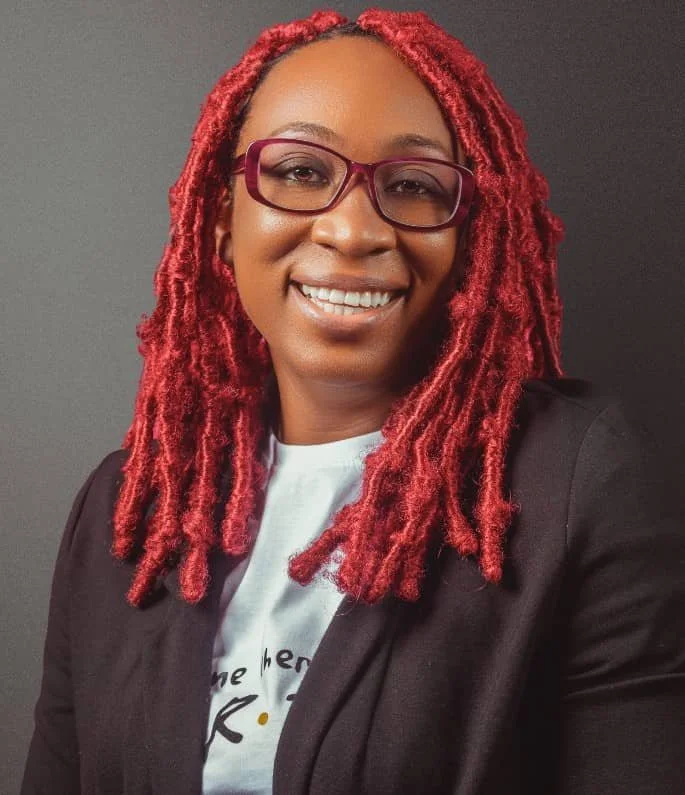An Interview with Timendu Aghahowa, Author of “The Bishop’s Prodigal Daughter”
By Adedayo Onabade
Timendu Aghahowa has been a voracious reader since she was four years old and started writing professionally after a very short stint in stockbroking. She was a participant in the 2013 Farafina Trust Creative Writing Workshop. Her short stories have been published in elevenelevenjournal.com, jsardent.com, and in the anthologies, A Handful of Dust and Pepper Soup.
She has been a screenwriter for the past decade with writing and script editor credits on many popular Africa Magic shows and was most recently nominated for an AMVCA award for Best Writing as Co-Head Writer for Masquerades of Aniedo and is currently the Head Writer for the telenovela Omera.
Timendu loves cake, brightly coloured hair, listening to music, and constantly courts financial ruin with her book-buying habit. She lives in Lagos with her husband and two children.
The Bishop’s Prodigal Daughter is her first novel.
THE INTERVIEW BY ADEDAYO ONABADE
The Bishop's Prodigal Daughter centers on faith, family, love, religion, betrayal, and many other subjects. What led to the creation of this multilayered work?
I wanted to write a romance with Christian characters set in the spaces of faith and family that I live. I wanted to see some variation of my people on paper.
Your book is reminiscent of the biblical parable of the prodigal son but with a twist. Why did you think it was necessary to flip this age-long narrative?
First and foremost, because the exploration of this idea was entertaining to me. As a self-identifying Prodigal Child, I wondered about situations and scenarios in which such prodigality would occur, and here we are.
We see how parental action bolsters sibling rivalry. How do you think situations like this can be nipped in the bud before degenerating into more serious issues?
I think sibling rivalry can be nipped in the bud by actually doing the job of parenting each child as an individual rather than pitting them against each other because it’s easier or more convenient. Lessons can be taught without comparisons.
You created a strong, defiant, and opinionated lead character in Eloviano Obrukhe. Yet we see the public perception of such women as a sore thumb through co-characters' eyes. How do you suggest we address this problematic narrative?
I think we can approach strong characters with grace and understanding. What we consider overpowering is often just passion.
Still on Elo. We do not necessarily see a total reformation in her character. Why did you choose to go this route?
I don’t think people change completely, or at least they don’t change so quickly. Especially as a person of faith, I think it is problematic and possibly self-defeating to think that character flaws can disappear overnight. I think accepting that some things will take time allows us to offer more grace to others and ourselves.
Let's move to Datonye—the tall, dark, handsome, and sensible—the dream man. His self-awareness of his fallibility is alluring. What key features did you consider in creating his character?
I wanted a character who would be the cooling touch to Elo’s fire, someone she could be her passionate self around, and it wouldn’t be too much. I made him to be a safe person for her, which I think is what makes him so alluring for the rest of us. We all want our safe person.
Faith can often be a touchy subject, yet you address it unbiasedly, showing the faults that sometimes fragment a community of people with shared beliefs. Why was this important for you to portray?
I’m a Church Aunty. I grew up as a Baby Girl for Jesus, and I experienced a lot of things with a lot of people and watched others go through their own experiences, which were wonderful and heartbreaking. It was important for me to express and share the biggest lesson I’ve taken away from all of it, which is that we are here because of what we believe. We believe that God is Love; therefore, nothing can be more important than loving God and loving each other.
While the church stands as a beacon of light, hope, and integrity in society, your story shows that the reverse can sometimes be the case. What causes this, and where do we collectively combat this anomaly?
I wish I knew. I can only hope that as a body, the Church remembers that we are here to love and reconcile, not stand in judgment.
Romance is sometimes stereotyped as an unserious genre, yet you created a story that maneuvers the tired trope of fairy tales. How were you able to make the story one of heartwarming yet authentic progression?
Thank you for the compliment. I didn’t know I did that. I’m a big fan of fairy tales, so I wouldn’t have had a problem with being classified as such. However, I suppose my book resonates with readers because I tried to make my characters as realistic as possible. To a large degree, I coded them to particular people in my life and built from there.
You hint at a budding love story between Tosan and Zino. Can we expect anything in this regard?
Yes, you can. Zino and Tosan’s love story will be explored in my next book. I’ve finished the first draft and am letting it sit for now, but I should be done with it by next year.
The Archbishop strikes as a woman of strength, influence, and doggedness in the face of challenges. Are there any women—in your life or around you—who spurred the creation of this character?
I think this is the core of almost every woman in my extended family: women who run businesses, who changed careers after raising a whole gaggle of children, and women who keep the entire family together. I would name them, but we would run out of room.
What one thing about Elo, the protagonist, impresses you the most?
I love that she’s so strong-willed. Sure, sometimes it becomes a bit irrational, but it's better than being passive.
You brilliantly close the book with an after-note explaining the rationale behind the location. Where did you get the inspiration to do this?
I am an idealistic, wish-fulfillment dreamer. As a Daughter of the Niger Delta, I have many wishes for our region and our people. As a writer, this is my way of dreaming some of my wishes into being. I suppose you could say the inspiration for this dreaming was my late father, Chief Chris Ghomorai, who was a grassroots and tribal leader. I will probably never go into politics (fingers crossed), but at least, this one I can do.
In the Acknowledgments, you recognize key figures and pastors who have been instrumental to your journey by pastoring you over the years. As a retired prodigal, if you met an ‘Elo’ in person, what would you say to her?
If I met an Elo in person…I don’t think she needs to be told anything. I think ‘Elos’ are pretty aware of their place and how far they have fallen. I would rather give Elo care and attention with no expectations. Elo doesn’t need more preaching; she just needs to be loved.
When you're not writing or working on movies, what do you do for fun?
I love to read. My favourite genres are romance, fantasy, science fiction, and self-help/psychology. I started baking during lockdown, and once in a while, I’ll bring out my pans and make a chocolate cake, but that’s a hobby that isn’t great for my waistline.
Interviewer’s Biography
Adedayo Onabade is a Nigerian essayist, fiction, and poetry writer. She holds a B.A. from Olabisi Onabanjo University and an M.A. from the University of Lagos, both in English Literature. Her works have been shortlisted for SynCity's 'Poetry in Times of Corona' and #TwitterWritingContest.
Adedayo volunteers with STER (Stand to End Rape Initiative), a social justice organization that works to combat sexual and gender-based violence against women, girls, and vulnerable people. Outside writing, she is fascinated by NatGeoWild, art galleries, reading, and documentaries.


